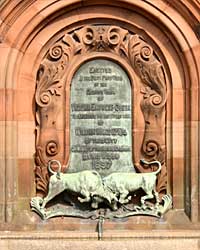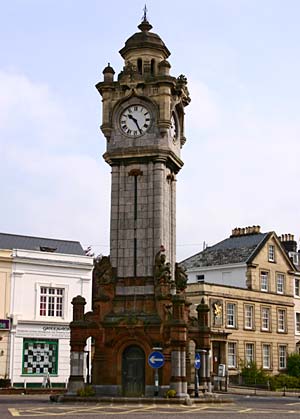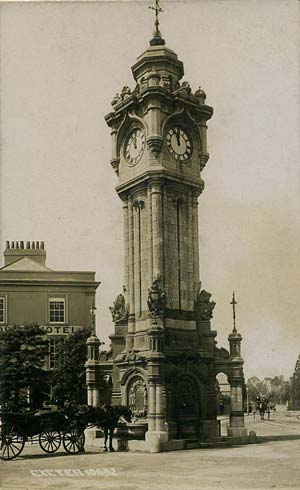
Miles' Clocktower - Queen Street
Page updated 12 June 2009
 Located at the top of
Queen Street, the Clock Tower
has for many years acted as a prominent landmark when giving directions
or as a place to meet. It was erected by Mrs Louisa A Miles in 1897 in
memory of her husband who died in 1881 at the age of 81.
Located at the top of
Queen Street, the Clock Tower
has for many years acted as a prominent landmark when giving directions
or as a place to meet. It was erected by Mrs Louisa A Miles in 1897 in
memory of her husband who died in 1881 at the age of 81.
Miles had lived for many years in Dix's Field with his first wife
who
was older than him. Miles and Louisa had married in 1870 when Miles, a
widower was 70 years old and Louisa then 50, in Western-Super-Mare.
Miles was a retired army officer, Exeter Magistrate and philanthropist.
He was an expert on animal welfare, especially horses. In 1846, Miles
wrote the Treatise on the Horse's Foot which was the most authoritative
book on the subject at that time, and remained so for the rest of the
century.
In July 1877, Miles was concerned about the many horses that were
plying between Exeter St David's Station and the city centre. He paid
for a granite drinking fountain for horses to be placed in the centre
of the intersection of New North Road, and Queens Street, known as the
Quadrangle.
After his death, his widow, Louisa determined to build a lasting memorial to her husband in the same position as the horse fountain. It took several years for the plans to be finalised as they became more elaborate. The tower was designed by the 27 year old, local architect, Thomas A Andrews of Bedford Circus, who prepared all the detailed drawings himself, and moulded and prepared all the models for the sculptor. The bronzes were cast by Singer & Son of Frome who also manufactured all the wrought-iron lamps, since removed.
The tower was constructed by the local stone masons, J Easton and Sons, Paris Street, out of red Corsehill stone and Chudleigh limestone. The interior of the clock tower is hollow and contains a stairway to the top, allowing for the clockwork movements, to be wound (now electric). Each illuminated face is 4ft 6in in diameter. There is a large plaque on one side that bears the above inscription. The other three sides bear the text from the Book of Proverbs, the Miles' coat of arms and a door leading to the interior.
The contractor, J Easton made an error when quoting for the work, and underestimated the eventual cost, but completed the structure. Mrs Miles discovered the error and voluntarily paid an extra £300 as a gift, so that Easton's would not be out of pocket.
The original horse fountain is still in place, having been incorporated into the tower. The first horse to drink from the fountain after the Clocktower was opened, was the horse that had drawn Mrs Miles to the opening ceremony. Louisa Miles also funded the spire for St Leonard's Church - she died in 1907 at the age of 89.
Erected
in the sixty first year
of the
glorious reign of
Victoria Empress Queen
To perpetuate the beneficent work
of
William Miles Esq
of this city
on behalf of the animal creation
by his widow
1897
In
1994 an electrician was called to find out why the light in one of the
clock faces in the Clock Tower wasn't very bright. He found an empty,
80 year old Guinness bottle dating from 1913 blocking the light through
the translucent clock face. The Guinness had been bottled at St Anne's
Well Brewery, and had been left by a previous workman.
With the increase of traffic during the second half of the 20th century, the Clocktower has come in for criticism because of the poor traffic flow and accidents. There was a call to remove it, but it was made into a Grade II listed building and is now protected.
Sources: The Ironmonger 18 Feb 1899, Express and Echo and Flying Post.

The
Miles Clocktower at the Quadrangle.
 A welcome drink at the Clocktower.
A welcome drink at the Clocktower.
│ Top of Page │